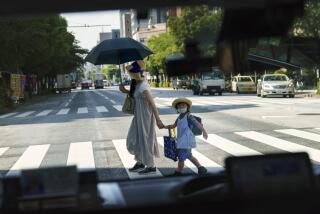Crisis Puts Cherished Ideals to Test
- Share via
TOKYO — The streets are still safe, the people well-dressed, the upscale restaurants still filled with patrons even amid Japan’s brutal economic restructuring. But beneath the orderly surface, in places like Tokyo’s blue-collar district of Ota, Tsuneo Moriya counts up the quiet tragedies.
Two of his friends are dead, he said. Both beset by debt, one killed himself in his office, another hanged himself from a tree. One friend is in prison, having tried to rob a trust bank with a toy gun. Others have gone bankrupt, gotten divorced or spend days at the racetracks or in pinball parlors, trying to make the big score.
Often they gather in the streets to drink sake, because it is cheaper than going to a bar. The economic pressure has turned honest men into liars and wrinkled with worry the faces of friends, says Moriya, who delivers equipment throughout the Ota district.
“They’re good people, all of them,” he says, taking a drag on a cigarette. “But there will be more suicides. More bankruptcies. More divorce.”
The painful effects of Japan’s changing economy may, by American standards, seem limited, especially since firms here still balk at wholesale layoffs. That is because there is a social consensus against allowing a destabilizing gap between rich and poor to grow too large.
In the face of wrenching change, some people simply have sought to find new advantage in leading more relaxed lives. For example, after her lucrative jewelry business plunged by two-thirds last year, Yukari Isobe, 40, a mother of two, decided to devote more effort to activities like writing essays and playing tennis.
Yet, for others, the pain is real: record bankruptcies and consumer debt; pervasive lifestyle changes; increases in divorce and suicide; more crime and gambling. Homelessness also is on the rise as a shakeout in the construction industry has thrown older men into the street.
Many here lament that the social values of trust, loyalty and looking out for each other are forever changing in the face of Japan’s now harsh economic climate. Many voice fears that the nation is headed the way of the “dry” United States, which is perceived here as a dysfunctional society in which human dignity is curtly sacrificed for economic efficiency.
In Tokyo, the hardest hit are struggling in areas few outsiders see: the grimy workshops of the Ota district; the mean streets of Sanya, the capital’s hidden slum area; small-business offices in blue-collar areas where men share stories of divorce, bankruptcy and bitterness.
In the Shinjuku area, cardboard hutches etched with “Help Me” share space with towering skyscrapers and fancy hotels. Over in Sanya, hundreds of bedraggled, bleary-eyed men line up at 7 a.m. for free weekend lodging.
Experts say the recession and restructuring are throwing a new breed of former company workers into the streets along with the chronic homeless.
Although reliable figures are unavailable, several measures suggest that the problem is increasing. In Shinjuku, charitable servings of free noodles skyrocketed to 93,976 in 1995 from 3,877 in 1993. In Sanya, requests for public aid nearly quadrupled in five years to 99,106 in 1995.
In its first survey of homelessness, the Tokyo metropolitan district estimated the total at 3,300. But many believe that the number is too low.
“Today’s Japanese society is getting nastier,” says Katsuhisa Moriya, a welfare worker who has patrolled Sanya for 20 years. “The weak, excluding the disabled, get no support from anybody.”
The economic uncertainty has driven more people to gambling, crime and mental stress.
Gambling on boats and horses has steadily increased since 1990. At one recent race outside Tokyo, as throngs of business people watched the speeding craft on TV monitors, an electronics firm salesman, 53, said he was aiming to supplement his income after a 50% pay cut since 1988.
Crime, in general, has become a growing problem since the 1970s. But robberies have shown a particular rise since Japan’s economic bubble burst, and stories of groups of boys preying on older men have grabbed headlines. Robberies of late-night markets jumped to 193 in 1994 from 29 in 1989, police figures show.
The number of incidents still is paltry in a nation of 125 million. But burglaries are no longer shockingly rare. Toshimi Yoshida, an auto-parts maker, said families in his close-knit neighborhood have begun to deliberately leave out $100 in their homes so burglars frustrated by a small haul won’t retaliate.
In 1994, the proportion of suicides attributed to economic hardship doubled to 11% from five years earlier. Divorce cases in 1995 hit their highest levels in 48 years, totaling 199,032.
Bumpei Ibuki, 57, is one face behind the trends. He says he divorced his wife in 1994 after 20 years of marriage because of economic pressure: a bankruptcy driven by a sour export deal with South Korea. As the banks closed in on him, his wife began drinking and berated him for what she called his stupidity. Ibuki asked her to start a new life. Initially shocked, she took a job for the first time in her life and now lives with their two sons.
“I didn’t want to involve her in my problems, but it’s easier to rebuild my life on my own,” Ibuki says. “I can fight the banks, but not my wife as well.”
Economic pressures also have taken a toll on mental health. Toru Sekiya, a Tokyo psychiatrist, says he has begun to treat growing numbers of men who are caught between a hostile workplace and complaining wives worried over how to make ends meet.
Women, too, are under strain as the besieged managers of diminishing household finances. With her husband’s firm teetering toward bankruptcy, Masako Onoue is pressed to take measures such as reusing bathwater for laundry and cleaning. But when she nudges her husband to reduce his staff’s working hours, he snaps at her to “ ‘shut up. I’m the one who makes the decisions,’ ” she said.
But the Japanese tend not to wallow in self-pity, and even those who appear the most down-and-out say they are ready and willing to build new lives.
Ryohei Amino, 53, has no home or job--but as he scans the want ads at a Shinjuku soup kitchen, he says he has a strong desire to work. And he still has his pride, symbolized by a black leather bag containing an electric razor and toothbrush. “No matter how low I fall, I take pride in being clean,” he says.
At a homeless shelter in Ueno Park, a 65-year-old man shows the pink scar on his left wrist and explains how he slashed it with a razor after being told he was too old to keep his job at a construction labor company. Better dead than homeless, he thought. But ask him what he would like to do with his life from now on, and his answer is firm and clear: “Learn computers.”
Megumi Shimizu and Chiaki Kitada of The Times’ Tokyo Bureau contributed to this report.
More to Read
Sign up for Essential California
The most important California stories and recommendations in your inbox every morning.
You may occasionally receive promotional content from the Los Angeles Times.














